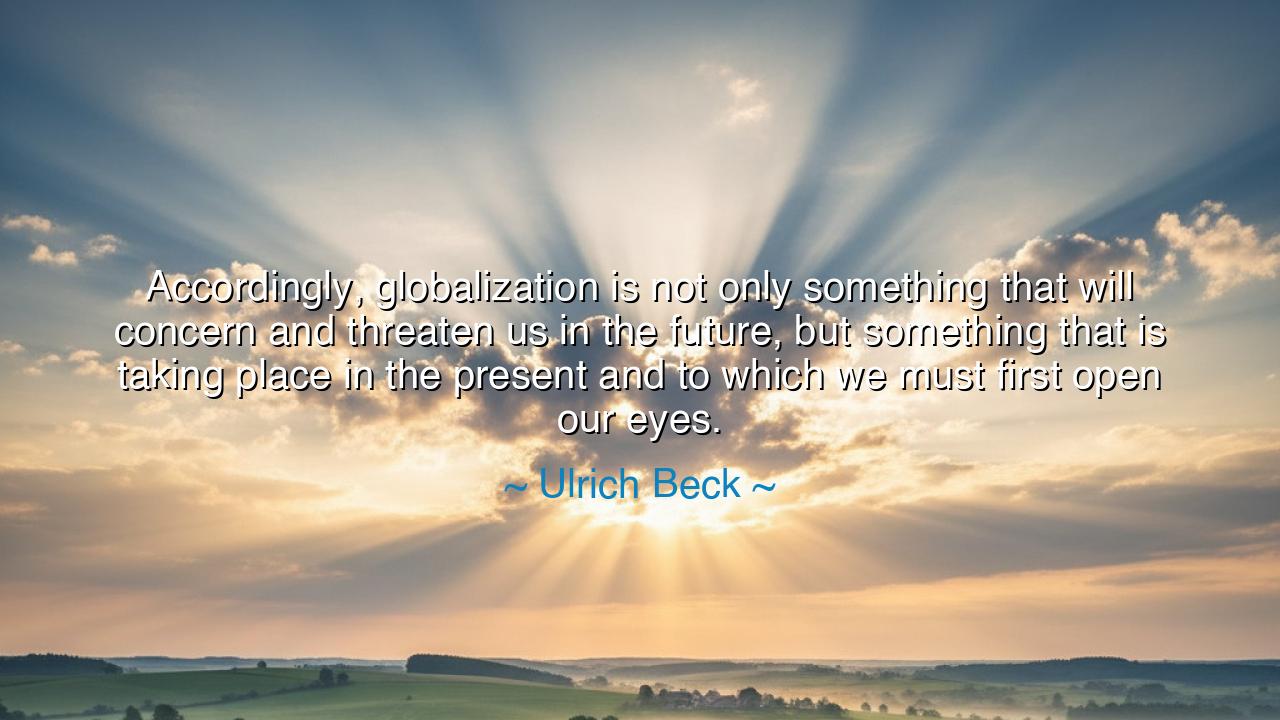
Accordingly, globalization is not only something that will
Accordingly, globalization is not only something that will concern and threaten us in the future, but something that is taking place in the present and to which we must first open our eyes.






In the grand arc of human history, there have always been moments when the world seemed to shrink, when forces beyond the reach of individuals began to shape the very fabric of life. Ulrich Beck’s words, "Accordingly, globalization is not only something that will concern and threaten us in the future, but something that is taking place in the present and to which we must first open our eyes," illuminate the profound truth that globalization is not a distant force, but a current reality, one that impacts us every day. Globalization is a force that we must not wait for, but engage with now, for it is already shaping the world in ways we often fail to see. Like the winds of time, globalization does not wait for us to prepare—it is here, now, and it is moving at a pace that demands our attention.
In the ancient world, the forces of conquest and trade brought distant lands into contact, much like how globalization today intertwines economies, cultures, and ideas. The Romans, in their imperial glory, understood the effects of globalization in their day. Their empire spanned vast regions, uniting people from different cultures under one rule. With that expansion came the flow of goods, knowledge, and ideas—creating a melting pot of cultures that transformed both the conquerors and the conquered. Yet, with such power and expansion came the danger of losing one’s own identity. The Romans, like us, faced the challenge of managing the tension between local traditions and the sweeping forces of a global empire. This tension remains relevant today as globalization brings both opportunity and challenge.
In more recent history, the story of the Age of Exploration speaks to the sudden and profound shifts caused by globalization. Christopher Columbus’s voyages opened the Americas to European powers, creating an interconnected world. The spices and silks of the East, the wealth of the New World—these brought immense wealth but also enormous consequences. Colonialism, the forced spread of influence, and the exploitation of resources are the darker sides of globalization. Yet, even then, the forces of exchange—cultural, economic, and intellectual—touched every corner of the world. Like the past, our present age of globalization brings both the potential for great progress and profound disruption. The lesson from history is clear: globalization is inevitable, but how we engage with it determines its impact.
Beck’s insight calls upon us to open our eyes to the present moment. Globalization is not something to be feared only in the future, but something we must address now. Consider the story of the printing press and Martin Luther. When Luther’s words, carried by the newly mass-produced printing press, spread across Europe, they ignited the Protestant Reformation, a global religious movement that reshaped Europe’s political and spiritual landscape. This was a moment when the communication revolution suddenly interconnected people and ideas across vast distances. Globalization of knowledge had begun, though it was not yet named as such. Luther’s ability to reach across Europe and challenge the Catholic Church’s authority is a prime example of how the forces of communication and connection can reshape the world. In the same way, we must see the connectivity of today—through the internet, social media, and international trade—not as a future concern, but as something that is already transforming our lives.
The lesson for us, as it was for those before us, is to act with awareness. Just as Socrates urged his followers to “know thyself,” we must now strive to know the world in which we live. We must understand how globalization shapes our lives today—whether it’s the food we eat, the clothes we wear, or the knowledge we share. The exchange of ideas has always been a double-edged sword, bringing both opportunity and challenge. In today’s world, the exchange of goods, culture, and information is faster, more complex, and more deeply intertwined than ever before. To navigate this new world, we must be informed, aware, and engaged.
In practical terms, this means we must embrace a mindset of awareness and adaptability. Do not wait for globalization to affect you, but seek to understand how it already influences your life. In what ways does the global economy shape your daily existence? How do climate change, migration, or technology affect your community and culture? To be truly engaged in this global moment, we must educate ourselves about the forces shaping our world and be prepared to adapt to the opportunities and challenges they bring.
Ultimately, the key is not to fear the changes that globalization brings, but to seize the opportunities they present. Empower yourself with knowledge, seek collaboration across borders, and never forget that understanding the global forces at play will help shape a future that is inclusive and equitable. The world is not something that is happening to us in the future—it is something that we are shaping in the present. As the ancients understood, to influence the course of history, we must first be aware of the forces at work and be willing to engage with them. Only then can we create a future that reflects the best of our collective potential.






AAdministratorAdministrator
Welcome, honored guests. Please leave a comment, we will respond soon